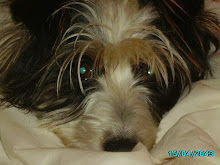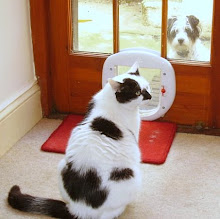
Wishing everyone a good Christmas - here's a tale that makes me cry every time. In January's edition of Cornwall Today, out now.
Caring for Cornwall’s unwanted animals is a heartwrenching but deeply rewarding job
“Nothing would stop me doing this job, heartbreaking though it is,” says Louise Barker. “I don’t think any of us can say we don’t get emotionally involved. If you ever stop shedding a few tears then I think it’s time to walk away.”
Louise Barker, 38, is the manager of the National Animal Welfare Trust (NAWT) rescue centre on the outskirts of Hayle. Founded in 1971, the NAWT is now one of the top 10 animal rescue and re-homing charities in England, and runs 5 centres across the country, located in Berkshire, Essex, Somerset, Cornwall and Watford.
“Molly Wyatt was a lovely eccentric lady who’d been rescuing and re-homing dogs and cats in Cornwall for 25 years,” says Louise. “When she was diagnosed with terminal cancer she asked the NAWT to continue her work and they were happy to do so.”
Louise has been manager at Hayle since January 2008. Before that she managed another animal rescue centre in Leicester for 9 years, but when this post came up, she jumped at it. She explains, “My sister lives here and my husband has family down here, so moving to Cornwall really is living the dream.”
Louise has always worked with animals and currently has two rescue dogs and a rescue cat, “but the numbers go up and down! I’m a sucker for taking in older animals.”
Any animal lover will feel at home at the centre in Hayle: dogs bark and volunteers and staff come in and out of reception carrying dog leads, treats and blankets. The atmosphere is warm, friendly and you can sense the passion for helping animals.
The facilities were very basic but in August 2008 the Trust purchased the land they had been renting and the new homing centre was ready to move into in November 2008. This cost over a million pounds to build, has 24 kennels and 20 cat pens and is eco-friendly. “The old centre will be demolished but we’ll salvage as much as we can to make staff kennels, so staff can bring their own dogs to work,” says Louise. “There will also be staff accommodation so that someone will always be here over night.”
The money for the new centre was raised following years of hard work. “The Cornish are wonderful fund raisers,” Louise says. “They turn up in any weather because they’re passionate about helping dogs. There are no warm weather volunteers in Cornwall.”
In addition to fundraisers, there are about 25 helpers who walk dogs, clean kennels and carry out home checks. “We’re always looking for volunteers and now with the new centre we’re looking for cat carers as well,” says Louise. “Some stay all day, some can only stay an hour.” Louise smiles. “The cat helpers are called Fussers and Brushers! Socialising the cats for a few hours is so valuable because we don’t have time. Without this we wouldn’t be able to re-home half the cats we do because they’re so frightened.”
Volunteers are of all ages but have to be over 16. “They don’t need experience,” explains Louise. “As long as they have a caring nature and their hearts are in the right place, they’re always welcome.”
The Trust have a policy that no healthy animal is ever put to sleep, but there is occasionally an exception to the rule. “Most dogs just need rehabilitation though sadly we sometimes get one which is so nasty we can’t deal with it and it has to be put down.
“Once we’re full we sometimes foster dogs and sometimes we tell people we’ll fit them in if they can hold on a while.” She sighs. “We usually find homes for the older dogs because they’re quite calm. It’s often the younger loopy ones that end up being long termers. If we can’t find a home they just stay with us.” Walking through the kennels she points to a black and tan cross breed who wags his tail as he sees us coming, his dark eyes full of hope. “I won't even tell you what he's been through,” she says. “He's been here since last November. So far nobody wants him.”
The current recession has had all kinds of repercussions. “Some people leave us money in their Wills but because houses aren’t selling we don’t get the big donations,” Louise explains. “Some volunteers can’t afford the petrol so we’ve lost them. The only place that hasn’t been affected is our charity shop in Falmouth. Perhaps people can’t afford new stuff so they’re buying from there; the shop always needs donations.”
It’s no wonder the staff shed a tear most days as they see plenty of life’s casualties. “We’ve had people having to move into rented accommodation who’ve lost everything and probably the only thing that’s helped them through is their dog. If they have to bring that into us as well, that’s just choking.” Louise continues, “with the recession we’ll see more of this – this week alone we’ve had 3 people begging us to take their dogs.”
Others can’t afford to keep their animals. “The dog wardens pick up a lot more dogs now whose owners have let their dogs loose because they can’t afford to pay vet fees.”
Like any jobs, this one has its down side. “It’s very frustrating dealing with human beings who don’t know any better,” says Louise sadly. “Sometimes they turn up with animals in an appalling state. It’s not always cruelty, it’s ignorance. It would help if dog licences were brought back as it would teach people to be more responsible.”
Another disadvantage is lack of money. “It would be lovely to have a larger centre,” Louise says wistfully. “We’d always fill it no matter how big it was. We rely on volunteers for food but some dogs need specific diets.
“We also need money for vets’ fees, though we have a great vet who gives us a discount. We have a vet room in the new centre but we can’t afford the equipment for operations so it’s just going to be used for health checks and vaccinations.
“Exercise equipment would help socialise the dogs and teach them how to play. A hydrotherapy pool would help relieve the stress of being in kennels and help build up muscles for the undernourished or arthritic dogs. I’d love to employ someone to train dogs and go into the community to teach people how to look after their pets properly.” She smiles. “But any donations that improve the animals’ quality of life or simply brighten their day are always gratefully received.”
Christmas is a strained and stressful time, as Louise explains. “People seem to part with their pets prior to Christmas, so our policy is not to re-home any animals at Christmas to prevent them going as presents. The Christmas fortnight is not an ideal time for a dog to settle into a new home. Though there are exceptions, namely elderly people who live alone.”
For anyone stuck for birthday or Christmas ideas, the NAWT offer the gift of a year’s sponsorship of a dog kennel or cat pen which comes with photos and a folder of information. With this in mind, Louise would like to create more awareness of NAWT in Cornwall. “I’d like to get more local businesses involved maybe in sponsorship and have open days so people can come and look round.” She grins. “The official opening of the centre will be in May 2009 and I’m told that royalty has been invited. I’m practising my curtsey!”
It’s clear that Louise, her staff and volunteers all have one thing in common: the animals’ happiness. Without them, Cornwall would be a poorer place. “You can really make a difference,” she explains. “It’s very hard and emotional but it’s very rewarding. When you see a frail, nervous dog transform into a really happy one and you find it a new home, you know that you’ve changed the rest of its life.”
National Animal Welfare Trust
Wheal Alfred Road
Hayle TR27 5JT
01736 756005
Opening hours 11am-3pm
Dogs to be re-homed are featured on the website, which is updated weekly -
www.nawt.org.uk
NAWT Shop, 38 Church Street, Falmouth TR11 3EF 01326 211700
Open 10-4 Monday-Saturday. Donations of items in good condition (not electrical or furniture) or offers of help are welcome.

















